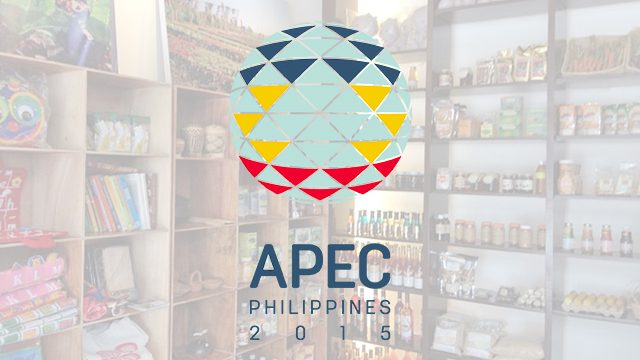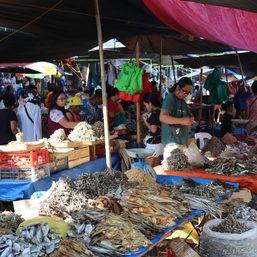SUMMARY
This is AI generated summarization, which may have errors. For context, always refer to the full article.

MANILA, Philippines — Making the region more friendly to micro, small, and medium enterprises (MSMEs) could be the major success of the Asia-Pacific Economic Cooperation (APEC) Philippines 2015, several economists said.
But before pushing for a MSME-friendly region, some economists said the Philippine government should first resolve its own policy gaps and conflicts that disempower microentrepreneurs. (READ: Is Nanay Tess’ bagoong ready for ASEAN integration?)
The last time the Philippines hosted APEC summit in 1996, liberalizing the telecommunications services sector was considered its major success.
For this year, several economists said it could be placing MSMEs at the front and center of regional trade.
Solve own policy conflicts first
“But before that, we should first make our policies more friendly to MSMEs. For example, in the procurement law, if you are micro or small entrepreneur, you are automatically disqualified in a bidding. That’s just for the domestic market,” an organizer of this year’s APEC summit said in an interview.
The APEC organizer added that rules of Bureau of Internal Revenue (BIR) for tax compliance are “only friendly for big players.”
“We are making it difficult for small players to pay taxes. The National Internal Revenue Code is very difficult to comply with. This disempowers microentrepreneurs,” the source said.
Alvin Ang, professor of Economics and senior fellow of Eagle Watch, Ateneo de Manila University’s (ADMU) macroeconomic forecasting unit, echoed the APEC organizer’s remarks, as saying “bringing in MSMEs on the inclusiveness agenda” could be this year’s champion.
“This gives an enhanced role for the private sector at the micro-level in partnering with the government in addressing inequality,” Ang said in an e-mail correspondence.
In the Philippines, MSMEs account for about a third of the gross domestic product, represent 98% of all registered businesses, and employ more than 50% of the entire domestic workforce.

The Philippine trade department is forecasting the country’s economy to grow “a little over 6.5%” this year as foreign investments, consumer spending, and export activities will continue its rise in a decade’s time.
Trade Secretary Gregory Domingo said stronger push in investment promotions and assistance to MSMEs will support economic growth. (READ: Aquino wants DTI’s Domingo to stay until APEC summit)
Prioritize climate change
But for Benjamin Diokno, University of the Philippines (UP) economist and former budget secretary, “APEC should address climate change.”
“Many APEC member economies, including the Philippines, are highly vulnerable to natural calamities. APEC should come up with a doable action plan and financing strategy to address climate change,” Diokno said in a mobile phone reply on Saturday, November 7.
The Indian Ocean tsunami in 2004, the earthquake in Chile in 2010, the earthquakes in New Zealand and Japan in 2011, and Typhoon Yolanda (Haiyan) in Micronesia and the Philippines in 2013 were among the major catastrophes that hit the region in recent years.
These catastrophes serve as an important reminder of the importance of APEC’s emergency preparedness work.
‘No big deal’
Setting aside these initiatives, Diokno said “hosting APEC is no big deal.” “It’s rotational and reciprocal.”
Short-term gains, according to the former budget chief, will be for hotels, restaurants, and tourism-related businesses. (READ: More non-working days for gov’t employees during APEC)
“But there are short-term costs, too. There is suspension of offices, classes, and cancelled flights,” Diokno said. (READ: Cancelled flights due to APEC meetings in November)
For the Bank of the Philippine Islands (BPI) research officer Nicholas Antonio Mapa, “the Philippines will gain in terms of increased press coverage and media mileage, possibly boosting both tourism and investor confidence.” (READ: LIST: Schedule of bank operations during APEC PH 2015)
“We also stand to benefit with the increased spending the government is forced to undertake. Case in point is NAIA (Ninoy Aquino International Airport) Terminal 1, which the national government had to fix up for the delegates,” Mapa said in an e-mail.
“Costs are the disruption to work and flights, with corporates bearing the cost mainly,” he added.
‘It’s a long stretch’
But the Philippines, along with other member economies, may not see a significant development come the APEC Economic Leaders’ Meeting in the country on November 18 to November 19.
“Implementing policies to reduce inequality and making growth inclusive is a tall order, because countries in the region must not compromise the ‘key strategic priorities of economic growth and fiscal sustainability’,” ADMU’s Ang said.
For UP’s Diokno, “some policymakers attribute the growth in APEC member economies to the association, but that’s a stretch.”
“Many countries would have grown fast with or without APEC. We can benefit more if our leaders focus on solving our own problems: poor infrastructure, antiquated tax system, high cost of doing business, policy inconsistency, restrictive provisions in the Constitution and so forth,” Diokno added. “The economic landscape has changed.”
“I am not aware of any pending reforms and deals that can come out of this meeting. Just hoping for increased bilateral deals with some major economies to help boost our trade channels to complement our traditional services sector,” BPI’s Mapa said.
Other than President Benigno S. C. Aquino III, 20 other heads of member economies are expected to attend the APEC Economic Leaders’ Meeting here in Manila. They are from Australia, Brunei Darussalam, Canada, Chile, Chinese Taipei, China, Hong Kong (China), Indonesia, Japan, Malaysia, Mexico, New Zealand, Papua New Guinea, Peru, Russia, Singapore, South Korea, Thailand, the United States, and Vietnam. — Rappler.com
Add a comment
How does this make you feel?





![[ANALYSIS] A new advocacy in race to financial literacy](https://www.rappler.com/tachyon/2024/04/advocacy-race-financial-literacy-April-19-2024.jpg?resize=257%2C257&crop_strategy=attention)


![[In This Economy] Can the PH become an upper-middle income country within this lifetime?](https://www.rappler.com/tachyon/2024/04/tl-ph-upper-income-country-04052024.jpg?resize=257%2C257&crop=295px%2C0px%2C720px%2C720px)

There are no comments yet. Add your comment to start the conversation.